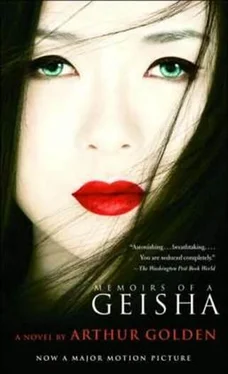“I was talking with your father about you, Chiyo-chan,” he said to me. “I live across the ridge in the town of Senzuru. It’s bigger than Yoroido. I think you’d like it. Why don’t you and Satsu-san come there tomorrow? You’ll see my house and meet my little daughter. Perhaps you’ll stay the night? Just one night, you understand; and then I’ll bring you back to your home again. How would that be?”
I said it would be very nice. And I did my best to pretend no one had suggested anything out of the ordinary to me. But in my head it was as though an explosion had occurred. My thoughts were in fragments I could hardly piece together. Certainly it was true that a part of me hoped desperately to be adopted by Mr. Tanaka after my mother died; but another part of me was very much afraid. I felt horribly ashamed for even imagining I might live somewhere besides my tipsy house. After Mr. Tanaka had left, I tried to busy myself in the kitchen, but I felt a bit like Satsu, for I could hardly see the things before me. I don’t know how much time passed. At length I heard my father making a sniffling noise, which I took to be crying and which made my face burn with shame. When I finally forced myself to glance his way, I saw him with his hands already tangled up in one of his fishing nets, but standing at the doorway leading into the back room, where my mother lay in the full sun with the sheet stuck to her like skin.
* * *
The next day, in preparation for meeting Mr. Tanaka in the village, I scrubbed my dirty ankles and soaked for a while in our bath, which had once been the boiler compartment from an old steam engine someone had abandoned in our village; the top had been sawed off and the inside lined with wood. I sat a long while looking out to sea and feeling very independent, for I was about to see something of the world outside our little village for the first time in my life.
When Satsu and I reached the Japan Coastal Seafood Company, we watched the fishermen unloading their catches at the pier. My father was among them, grabbing fish with his bony hands and dropping them into baskets. At one point he looked toward me and Satsu, and then afterward wiped his face on the sleeve of his shirt. Somehow his features looked heavier to me than usual. The men carried the full baskets to Mr. Tanaka’s horse-drawn wagon and arranged them in the back. I climbed up on the wheel to watch. Mostly, the fish stared out with glassy eyes, but every so often one would move its mouth, which seemed to me like a little scream. I tried to reassure them by saying:
“You’re going to the town of Senzuru, little fishies! Everything will be okay.”
I didn’t see what good it would do to tell them the truth.
At length Mr. Tanaka came out into the street and told Satsu and me to climb onto the bench of the wagon with him. I sat in the middle, close enough to feel the fabric of Mr. Tanaka’s kimono against my hand. I couldn’t help blushing at this. Satsu was looking right at me, but she didn’t seem to notice anything and wore her usual muddled expression.
I passed much of the trip looking back at the fish as they sloshed around in their baskets. When we climbed up over the ridge leaving Yoroido, the wheel passed over a rock and the wagon tipped to one side quite suddenly. One of the sea bass was thrown out and hit the ground so hard it was jolted back to life. To see it flopping and gasping was more than I could bear. I turned back around with tears in my eyes, and though I tried to hide them from Mr. Tanaka, he noticed them anyway. After he had retrieved the fish and we were on our way again, he asked me what was the matter.
“The poor fish!” I said.
“You’re like my wife. They’re mostly dead when she sees them, but if she has to cook a crab, or anything else still alive, she grows teary-eyed and sings to them.”
Mr. Tanaka taught me a little song-really almost a sort of prayer-that I thought his wife had invented. She sang it for crabs, but we changed the words for the fish:
Suzuki yo suzuki!
Jobutsu shite kure!
Little bass, oh little bass!
Speed yourself to Buddhahood!
Then he taught me another song, a lullaby I’d never heard before. We sang it to a flounder in the back lying in a low basket by itself, with its two button-eyes on the side of its head shifting around.
Nemure yo, ii karei yo!
Niwa ya makiba ni
Tori mo hitsuji mo
Minna nemureba
Hoshi wa mado kara
Gin no hikari o
Sosogu, kono yoru!
Go to sleep, you good flounder!
When all are sleeping-
Even the birds and the sheep
In the gardens and in the fields-
The stars this evening
Will pour their golden light
From the window.
We topped the ridge a few moments later, and the town of Senzuru came into view below us. The day was drab, everything in shades of gray. It was my first look at the world outside Yoroido, and I didn’t think I’d missed much. I could see the thatched roofs of the town around an inlet, amid dull hills, and beyond them the metal-colored sea, broken with shards of white. Inland, the landscape might have been attractive but for the train tracks running across it like a scar.
Senzuru was mainly a dirty, smelly town. Even the ocean had a terrible odor, as if all the fish in it were rotting. Around the legs of the pier, pieces of vegetables bobbed like the jellyfish in our little inlet. The boats were scratched up, some of their timbers cracked; they looked to me as if they’d been fighting with one another.
Satsu and I sat a long while on the pier, until at length Mr. Tanaka called us inside the Japan Coastal Seafood Company’s headquarters and led us down a long corridor. The corridor couldn’t have smelled more strongly of fish guts if we had actually been inside a fish. But down at the end, to my surprise, was an office, lovely to my nine-year-old eyes. Inside the doorway, Satsu and I stood in our bare feet on a slimy floor of stone. Before us, a step led up to a platform covered with tatami mats. Perhaps this is what impressed me so; the raised flooring made everything look grander. In any case, I considered it the most beautiful room I’d ever seen-though it makes me laugh now to think that the office of a fish wholesaler in a tiny town on the Japan Sea could have made such an impression on anyone.
On the platform sat an old woman on a cushion, who rose when she saw us and came down to the edge to arrange herself on her knees. She was old and cranky-looking, and I don’t think you could ever meet anyone who fidgeted more. When she wasn’t smoothing her kimono, she was wiping something from the corner of her eye or scratching her nose, all the while sighing as though she felt very sorry there was so much fidgeting to be done.
Mr. Tanaka said to her, “This is Chiyo-chan and her older sister, Satsu-san.”
I gave a little bow, to which Mrs. Fidget responded with a nod. Then she gave the biggest sigh she’d given yet, and began to pick with one hand at a crusty patch on her neck. I would have liked to look away, but her eyes were fixed on mine.
“Well! You’re Satsu-san, are you?” she said. But she was still looking right at me.
“I’m Satsu,” said my sister.
“When were you born?”
Satsu still seemed unsure which of us Mrs. Fidget was addressing, so I answered for her. “She’s the year of the cow,” I said.
The old woman reached out and patted me with her fingers. But she did it in a most peculiar way, by poking me several times in the jaw. I knew she meant it as a pat because she wore a kindly look.
“This one’s rather pretty, isn’t she? Such unusual eyes! And you can see that she’s clever. Just look at her forehead.” Here she turned to my sister again and said, “Now, then. The year of the cow; fifteen years old; the planet Venus; six, white. Hmm… Come a bit closer.”
Читать дальше












